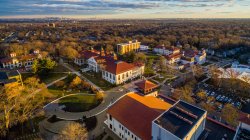Diversifying the Teacher Pipeline

Across the country, students of color attend schools where they rarely see themselves in their teachers. New Jersey is no different. Furthermore, while studies show that all students benefit from a diverse teaching workforce, only 16 percent of New Jersey educators are teachers of color according to the New Jersey Department of Education (NJDOE). Montclair State University has been working to change that, and a recent $750,000 NJDOE “Diversifying the Teacher Pipeline” grant that it shares with Rutgers University will encourage teacher diversity and expand recruitment and preparation opportunities for teachers of color in high-need schools.
Montclair State, which has a long-standing partnership with Newark Public Schools, will partner with the district in a 19-month pilot program that will, among other things, develop a pipeline of teacher candidates of color who want to return to teach in the community.
“It has long been a priority for us to produce a diverse teacher population for New Jersey schools,” says College of Education and Human Services Dean Tamara Lucas. “The ‘Diversifying the Teacher Pipeline’ grant will provide additional support for our efforts to recruit and prepare racially and ethnically diverse high school students to become future teachers in New Jersey.”
According to Center of Pedagogy Executive Director Jennifer Robinson, program efforts will focus on increasing the recruitment and retention of students of color with strong academic backgrounds to the University’s teacher education program; developing and placing a pipeline of teacher candidates of color in Newark Public Schools; and devising a district-based collaborative induction plan for Newark Teacher Project graduates.
Work on this program began even before the grant funding and is part of an ongoing effort by the University to address a teacher shortage in New Jersey, particularly teachers of color.
“Montclair State is again in the vanguard of teacher preparation and in leading the recruitment and retention of teachers of color — as well as teachers for urban schools,” says Robinson. “The program is purposefully meant to be a model for other programs across the state. The plan is to develop a set of strategies, policies and practices to share with other New Jersey teacher education programs.”
The new project will extend the work of the University’s innovative Newark-Montclair Urban Teacher Residency Program, the teacher certification program for college graduates and career changers committed to urban education that is the University’s model for site-based teacher preparation.
“The grant will also help to provide funding for summer community internships, digital backpacks and more, and allow us to continue Residency practices with additional certification areas,” she says.
The project is especially meaningful for Robinson. “Since 1998, much of my scholarship has been in the area of recruiting and retaining teachers of color, beginning with the establishment of Teacher Education Advocacy Center within the Center of Pedagogy,” she says. “This grant will help us sustain our work. Most important, it will help us learn more about how to do this work so that we can increase the diversity of the New Jersey teacher population.”
